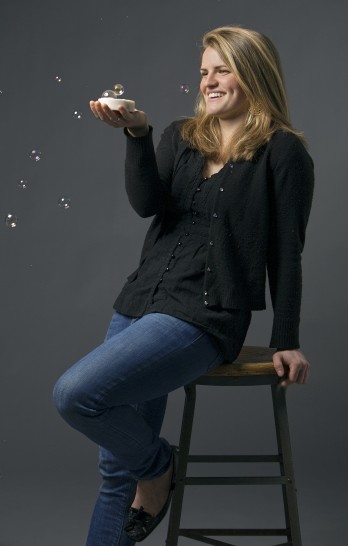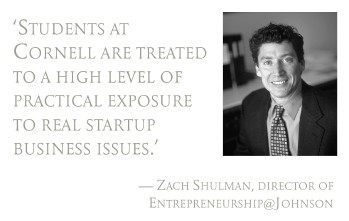COVER STORY

Nurturing big ideas at Cornell University: Planting seeds of innovation in the classroom
Click here to view entire story as one page.
Meryl Gabeler 10 took entrepreneurship classes, joined eLab and met with alumni to grow the Ayurvedic soap business she started with her mother. See larger image
Mark Levatich '10 has been a tinkerer and a problem-solver all his life. As a teenager, he built his own metal and woodworking shop, crafting the forge from scratch, and in high school he created a four-player chess game.
These days, Levatich, who graduated last December with dual degrees in biological and environmental engineering and biological sciences, is tinkering in a different area -- brain surgery.
After observing a number of neurosurgeries as part of an internship program at Weill Cornell Medical College in New York City, Levatich developed a device that uses bone cement to help surgeons seal holes created during pituitary surgery. His invention isn't available for human use yet, but in the meantime surgeons have created a new surgical technique based on his designs and performed it 17 times last summer. Levatich also was honored by the U.S. Patent Office as one of the top three undergraduate Inventors of the Year for 2009. Now he's hard at work creating his own company.
"I just asked the surgeons about the hardest things they do," Levatich says. "There aren't engineers in the hospital. No one had ever asked them that before."
It was a pure learning experience.
While many leading research universities take advantage of their location, infrastructure and an abundance of local venture capital to churn out startup companies from their inventions, Cornell's approach to entrepreneurship has always been focused on education: experiential learning to help students think and act like entrepreneurs no matter where their careers take them. At the same time, an increasing number of Cornell students and young alumni are using this knowledge to begin their own ventures.

As the United States continues to recover from the Great Recession, few areas are more important than developing entrepreneurs who can take their education into the marketplace and become the creative source for new jobs. As visiting business professor Steven Gal points out, "Entrepreneurs create the jobs that lead us out of recession; they always have and always will."